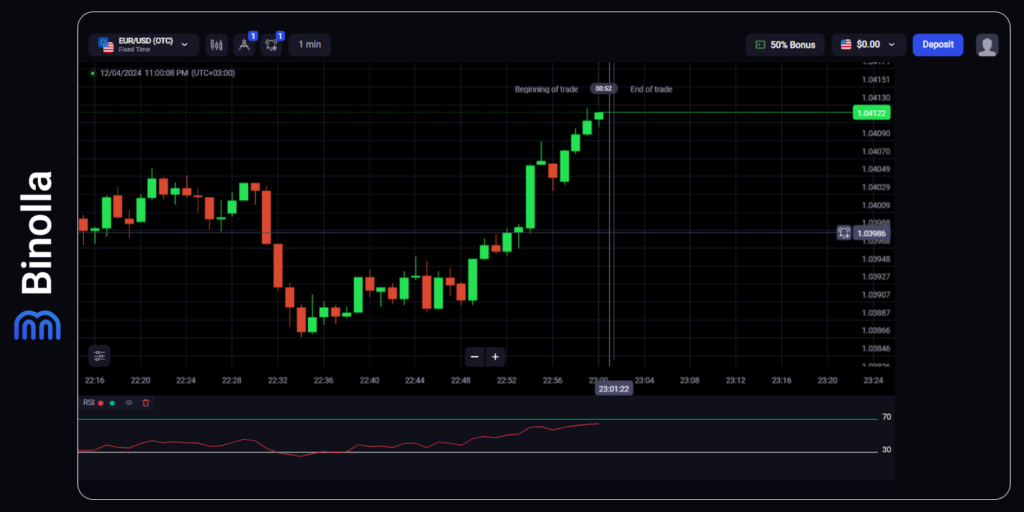Why Do Many Traders Love Trading with OTC?

OTC or over-the-counter trading is very popular among traders. This is a good alternative for direct market access as it has a lot of benefits as compared to traditional trading. Market participants choose OTC trading for many reasons. By reading this article, you will discover the basics of OTC and some examples of why market participants use it. Moreover, we will provide you with all the benefits and drawbacks of this type of trading.
Want to benefit from OTC trading? Join Binolla now and choose from a variety of assets available over the counter!
Contents
What is OTC?
First, let’s delve into the basics of this type of trading. As we have already mentioned, OTC stands for over-the-counter, which means that all orders that you place are not included in the standard market flow. Traders and investors conduct trades directly instead. This type of trading is widely popular in different markets, including stocks, bonds, currencies, cryptocurrencies, etc.
Nowadays, to trade over the counter, you don’t need to find a counterpart on your own. With the latest technological solutions, brokers offer this type of trade on their platforms allowing you to benefit from all its advantages just like you have access to direct market trading. The only difference here is that all the orders are not placed directly to the exchange and are executed when there is enough demand for an asset.
It is difficult to say when the OTC market appeared as all the trades between counterparts that are not added to the order flow of the exchange can be considered OTC. However, what is important is the reason why traders and investors sometimes choose to go OTC instead of buying and selling directly from the market.
Historical Reasons to Trade OTC

One of the key reasons for traders and investors to go OTC instead of opening their positions in the exchange is that such trades do not affect the price of the asset. Therefore, whatever amount you buy or sell, the market price will remain the same for the whole lot regardless of its size. This is quite an advantageous type of trading for those who want to trade huge amounts without losing money due to price fluctuations.
Imagine a situation when a trader wants to sell a decent amount of cryptocurrency with low capitalization. If they go to the exchange directly to sell it, their order may not be filled at once as there may not be enough demand. Therefore, the position will be cut into some separate parts and sold once enough demand for each part is found.
The balance between the supply and demand moves market prices. Therefore, if supply exceeds demand, the price goes down. In our case, by selling each part, you will see the price moving down and the next order filled in the exchange may bring you less money for the same amount of cryptocurrency as the previous one. By the end of the whole trade, the difference between the prices may be significant (this will depend on the balance between the supply and demand at the beginning of the trade and once the last part of the trade is filled).
To avoid this, those who want to buy huge amounts of an asset with low liquidity sometimes conduct transactions in OTC mode. By doing this, they do not affect the market price of the asset and can fill their orders entirely with the same price.
Another reason for choosing OTC is that a particular market may be closed at the moment. Those who have already had some previous Forex trading experience may have noticed that there may be a difference in prices on Friday and Monday. This is due to the fact that some trades are made over the counter. OTC trading is widely popular in stock exchanges where trading sessions are very short (just several hours a day) and traders want to buy and sell securities when exchanges are closed.
OTC trading has become increasingly popular with the development of pink sheets markets. These stocks also known as penny stocks are not traded on major exchanges. While they lack liquidity and may be considered risky, they attract traders’ attention by offering them higher profit opportunities. If a penny stock makes a decent uptrend movement one day, it can bring significant gains to its owner. Therefore, market participants buy and sell them over the counter expecting some stocks to significantly improve their wealth in the future.
One more reason for choosing OTC instruments is that they may not be available on major exchanges. It is not a secret that some traders and investors are ready for higher risks and want to buy assets that may show incredible performance in the future. Therefore, instead of going to exchanges or brokers, they buy penny stocks or pink sheets and hold them. Such financial instruments are available on major trading platforms. The only way to buy them is to conduct OTC trades.
OTC Legal Status
While OTC is an over-the-counter trading, these trades are currently centralized. They all go through a network of huge liquidity providers with a centralized headquarters in New York. Therefore traditional financial markets OTC is no more decentralized. Brokers like Binolla are connected to OTC liquidity providers and receive quotes from them.
Moreover, this network is fully trustworthy and transparent as it is regulated by the SEC, a US-based financial markets watchdog. All the price flow that a trader sees on charts comes from such a network. Therefore, trading OTC contracts is safe and totally legal whether you choose currencies or synthetic instruments such as various indexes, funds, etc. Moreover, traders can expect higher liquidity as the centralized OTC network brings together most if not all orders that are opened over the counter worldwide.
When it comes to cryptocurrency exchanges, they still don’t have such a network. The OTC trades are executed on separate platforms with lower liquidity, which means that you may spend days and even weeks to find a counterpart to sell your assets. Now that you know the basics of OTC trading and the current situation with this market, it is worth looking at the pros and cons of over-the-counter trading.
Advantages of Trading with OTC

Before starting or continuing your OTC trading journey, you can check the benefits and main risks of trading over the counter. The biggest advantages of this type of trading include:
OTC Trading is available 24/7
Whatever traditional assets you use for trading, they are not available all the time. Even Forex currency pairs that are traded 24 hours five days a week are not available on weekends. Moreover, during national holidays, when banks are closed, Forex currencies may suffer from lower liquidity, which may result in lower volatility. When it comes to OTC trading, you can buy different contracts during weekends. OTCs are also available on all holidays.
Why does this matter? Imagine that you are living in Argentina and you want to trade assets that are available during the European session. While you still can catch this opportunity in the morning, you will lose part of the European session. Moreover, if you can’t trade in the morning, then you will lose the whole session. Therefore, having an opportunity to buy assets over the counter significantly enriches your trading portfolio.
Higher Profitability Percentages?
When it comes to eventual profits, when trading OTCs they offer a higher percentage of profitability. This is due to the fact that such over-the-counter assets normally come with higher risks (penny stocks are less liquid, liquidity of currencies is lower during weekends, etc.).
However, when it comes to OTC trading at Binolla, for instance, you don’t need to think about liquidity as all trades are performed automatically via a broad range of reliable liquidity providers. Therefore, you can benefit from higher profitability with standard market risks that are part of any trading activities. Let’s do some calculations of profitable trades to see how your performance will improve with higher profitability.
| Asset | Investment Amount | Profitability | Outcome (without investment amount) |
| EUR/USD | $100 | 75% | $75 |
| EUR/USD OTC | $100 | 92% | $92 |
| GBP/USD | $100 | 70% | $70 |
| GBP/USD OTC | $100 | 89% | $89 |
| EUR/GBP | $100 | 77% | $77 |
| EURGBP OTC | $100 | 89% | $89 |
As you can see, by investing the same amount, you can have higher profits when trading OTCs. When trading with Binolla, you can find contracts with even 92% profitability, which will bring you even more gains.
A possibility to Use Standard Technical Analysis Tools
When trading OTC assets, you can use the variety of technical analysis tools that are available for traders buying traditional assets via the direct market. In particular, you can apply a variety of technical indicators from moving averages to more sophisticated ones like MACD, Bollinger Bands, and others.
Moreover, oscillators or momentum indicators such as the Relative Strength Index or Stochastic oscillator can also be used in your trading strategies. Additionally, market participants will have a full set of drawing tools at hand to forecast price fluctuations. For instance, they can use support and resistance levels, trendlines, or even Fibonacci retracement to improve their chances of profiting.
Therefore, technical analysis works for both OTCs and standard trades without any deviations. Whatever technical indicator or graphic tool you choose, you will be able to have the same results depending on the market situation. And with higher payouts, you can make even more money!
When it comes to strategies, you can use the same trading systems that you are using when trading standard contracts on standard assets.

For instance, an all-time classic with the RSI indicator when it leaves the overbought or oversold areas. As you can see, it works well as when the indicator leaves the oversold area, the price moves higher. All in all, you can use any strategy and you will see that it will perform the same way.
Diverse Assets Range
Traditional exchanges offer only listed assets. You can buy and sell Tesla or NVidia stocks there. However, plenty of interesting financial instruments are not available there. By using OTC trading, market participants will have access to a broader list of assets, including those with low liquidity that may show a great performance over time.
Apart from assets that may not be available at a particular time or various low-cost stocks, OTCs allow the creation of synthetic financial instruments.
Why Do Brokers Offer Higher Profitability

There are five main reasons for this. Let’s look at them closely:
- No news trading is possible. OTCs do not react to news and events, unlike standard assets. Therefore, traders can’t perform on various important data releases that may lead to significant trends and one-side momentum price movements;
- No fundamental analysis is applicable. Going further, it is worth mentioning that while news does not affect OTCs, fundamental analysis is also impossible as it consists of a set of news and events;
- Price manipulations by major market participants due to lower liquidity. OTCs offer lower liquidity as compared to traditional assets. Therefore, even smaller investments can change the situation significantly. When it comes to traditional assets, especially major currency pairs, they are protected against such manipulations by the volumes and their liquidity. Therefore, risks of manipulations by major market participants influence payouts for traders who use OTCs;
- Less predictable price fluctuations. As no news or events affect OTC price fluctuations, there is a higher risk of unpredictability for traders who use these assets;
- Lower volatility. OTCs rarely move in one single direction, which makes it harder for traders to plan their deals in advance.
Conclusion
OTCs are very popular nowadays due to many reasons. They allow market participants to trade around the clock and even on weekends and during holidays when exchanges and banks are closed. With OTC trading, market participants may have access to some assets that are not available on traditional exchanges. Moreover, there are plenty of available assets that can significantly increase the size of your portfolio. While there are some minor drawbacks, trading OTC digital options is advantageous, as you can conduct technical analysis without thinking about data releases that may break technical patterns.
OTC is a 100% legal way of trading when it comes to digital options. Brokers like Binolla cooperate with liquidity providers that are united in a global OTC network with headquarters in New York. This network is regulated by the Securities and Exchange Commission. Therefore, trading OTC via digital options is safe.
FAQ

What Is OTC Trading?
OTC trading is the process of buying and selling various types of assets (or buying digital options contracts) directly between two parties via special OTC networks.
What Is the Difference Between OTC and Exchange-Based Trading?
OTC trading is performed outside centralized exchanges. It began as p2p transactions. Nowadays, most OTC deals are conducted via brokers in a centralized manner, but these trades are not counted by exchanges.
What Types of Assets Can Be Traded via OTCs?
All types of financial assets, including currencies, stocks, commodities, indices, and even cryptocurrencies can be traded OTC.
What Are the Benefits of OTC Trading?
The key benefit of OTC trading is that you can trade them at any moment as trading is available 24/7, including weekends and national holidays when exchanges and banks are closed. Moreover, you will have access to a broader range of assets and higher payouts.







